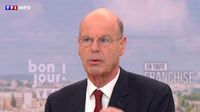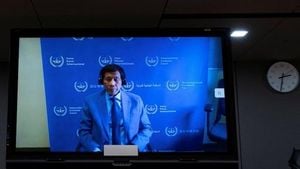The French government has put forth a plan to channel the savings of citizens into bolstering the military sector, as disclosed during a rally at Bercy on Thursday. Minister of Economy and Finance, Eric Lombard, emphasized that the state will not seize individual savings, aiming instead to enhance investment options available to the public. This announcement came alongside discussions about the increasing financial needs of the defense sector.
During the presentation, Lombard clarified, “I want to once again dispel a false idea: the State will never lay claim to the savings of the French, which they must have access to freely.” This statement reassured many citizens who had voiced concerns that their savings might directly support military funding. Instead, the government proposes the establishment of a dedicated fund through the public investment bank Bpifrance called 'Bpi Défense'.
The fund will allow investment starting from 500 euros, with a target capitalization of 450 million euros. Lombard indicated that investments would be locked for a minimum of five years, serving as a long-term contribution to the defense infrastructure. “These will be good investments,” he asserted, reflecting the government’s anticipation for increased military spending over time.
Nicolas Dufourcq, CEO of Bpifrance, supported the government's position, stating the need for the defense sector to secure approximately 5 billion euros in equity to escalate production capabilities. He noted that this fund is intended to guide citizen investments toward non-listed assets, highlighting that 70% of the allocations will prioritize French companies.
To further ease investor concerns, Lombard underscored that, “These placements will be available on a voluntary basis.” He assured that this new funding structure is not an attempt to forcibly redirect savings already allocated to regulated savings accounts like the Livret A, where a substantial treasury of approximately 442.5 billion euros currently resides. “The idea is merely to multiply the investment opportunities for those who wish to contribute,” he said.
However, a recent Odoxa poll conveyed that 58% of the French population is against having their savings used to support the defense sector, illustrating a significant public hesitance regarding government spending strategies. Lombard clarified that while the investment is voluntary, various long-term financial products like life insurance and retirement savings plans will be structured to include options focused on the defense sector.
“You will be able to become an indirect shareholder in these defense companies,” Lombard stated, emphasizing that these investments are targeted for those with long-term savings capacity. He noted that while the minimum investment is set at 500 euros, the upper limits are still under consideration but may extend to several thousand euros per investor.
Making strides toward enhancing the European defense infrastructure, Lombard articulated the critical need to invest strategically in defense capabilities, especially in light of growing global uncertainties. “We must prepare for peace and guarantee it,” he asserted, framing the current funding initiatives within the broader context of national and European defense strategies.
As France aims to bolster both public and private investments in the defense sector, Lombard anticipates that this new vehicle will provide vital funding. He expressed hopes that Bpifrance would hold stakes in at least 100 defense firms, a move poised to double the financing capacity already available.
This initiative underscores a commitment to evolving the French military's operational capabilities, with plans for future private investment options accompanying the public offerings. Lombard has suggested that the efforts will culminate in a range of financial products made available to investors, reinforcing the idea of cooperation between private capital and state interests.
In conclusion, this newly announced initiative underlines the French government’s dedication to enhancing defense preparedness while ensuring civic involvement through voluntary investment opportunities. It captures the dual necessity of mobilizing savings while respecting personal financial liberties, a balancing act that will be crucial in the coming years as the government faces mounting pressure to ensure national security.








